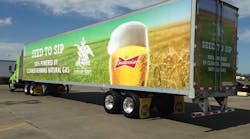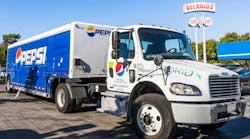Erik Neandross, CEO of transportation & energy consulting firm Gladstein, Neandross & Associates (GNA) took direct aim at what he called “the huge elephant sitting in the room,” the price of oil that has dropped to $50-$60 per barrel, in his opening remarks for the recent FleetOwner Webinar sponsored by Ryder that delved into various aspects of trucking on natural-gas power.
“There’s no doubt that a lot of the folks we work with every day are asking about the impact” of this on the market for natural gas, propane autogas and electric drive vehicles,” Neandross pointed out.
“But the bottom line for us is that diesel fuel is still not very cheap,” he continued. “National average pricing for diesel is in the $3.40-$3.50 per gallon range and that is by no means a bargain.”
Neandross said that due to geopolitical and economic reasons, “most believe that this dip is short-lived and prices will go back up. The one thing we have seen in the oil markets for the last few decades is volatility and petroleum prices tend to climb just as sharply as they drop.
“On the other hand, when we look at the price of natural gas, it has been very stable recently,” he continued. “When we look at the heavy-duty natural gas truck projects we are putting together today, we are seeing delivered natural gas costs in the $1.50 to $1.80 per diesel gallon equivalent [DGE] range, including all CapEx, OpEx and taxes.”
He said the resulting math works out positively for a “savings of $1.50 to $2.00, even in today’s market with low oil prices.”
Neandross added that “given these real-world and current examples we see in the market, we still see tremendous opportunities for fuel cost savings and long-term price stability with natural gas, thus the reason we see continued momentum in these markets.”
Providing a fleet perspective on incorporating natural-gas trucks into an over-the-road operation was Billy Lawder, director of transportation engineering for Anheuser-Busch (AB).
He noted that the mega-brewer’s “logistics snapshot” of 12 breweries and four distribution centers (DCs) in the United States amounts to a “complex shipping dynamic” that is served by a leased fleet of over 550 tractors.
Despite the challenge such an operation poses to integrating alternative-fuel vehicles, Lawder said that A-B determined it would embrace natural-gas power in keeping with a corporate goal of “bringing people together for a better world.”
“Natural-gas vehicles (NGVs) are part of AB’s multi-part logistics strategy,” he explained. “That has led us to integrate alternative fuel carriers into our over-the-road (OTR) profile—that is, lanes with infrastructure bid are carved out annual bids— and to utilize natural-gas vehicle fuel at U.S. breweries and DCs.”
All that being well and good, A-B still had to weigh the macro-economic considerations of residuals and depreciation, maintenance requirements and fuel costs before moving forward with its decision to start incorporating trucks spec’ed to run on compressed natural gas (CNG) fuel.
“While diesel tractors are a known commodity, e especially for core fleets,” Lawder pointed out, “CNG tractors are lesser known commodity.” He said the market’s relative “inexperience” with CNG trucks had to be viewed as a “high-risk premium.” To reduce that risk, it was determined that the CNG-fueled trucks should be leased from a provider “with more knowledge and experience,” which in this case was Ryder.
Regarding maintenance, he stressed that “CNG trucks have different requirements than diesel ones. These can include both state- and municipal-specific regulations that can add up to real money when up-converting to new vehicle specs.
“On top of that,” Lawder continued, “if a CNG truck breaks down, you can’t just tow it to any truckstop. For emergency breakdowns, you must consider having a service network in place that you can rely on to handle CNG-related repairs.” He also advised that there is “less certainty around the cost profile for maintenance of CNG trucks towards end of life.”
As for figuring out potential fuel savings vs. diesel, Lawder stressed that “fuel is not a static commodity – you have to understand the impact if the price spread changes.” That’s why he suggested viewing converting to CNG not just in terms of potential fuel-cost savings, but also as “a fuel-diversification strategy.”
Lawder penciled out how a fuel comparison might look. “If you assume fuel economy for CNG trucks is 15% lower than your current performance, you will see that more fuel will be used—but at a much lower price.
“It’s important to know what the profile is for the fuel you are buying,” he continued. “Pricing CNG is also difficult because ‘DGE’ is not a ‘standard’ for making an accurate comparison vs. the pump price of diesel.”
Also speaking was Jeff Campbell, director of marketing for Cummins Westport Inc. He said that the joint venture formed in 2001 by Cummins Inc. and Westport Innovations has to date delivered over 50,000 6- to 12-liter natural-gas engines for on-highway applications.
Campbell noted that the Cummins Westport “technology strategy” for natural-gas engines involves Cummins’ cooled exhaust gas recirculation (CEGR) technology as well the stoichiometric combustion and spark-ignition technologies that Cummins Westport focuses on along with the three-way catalyst (TWC) exhaust aftertreatment from the Cummins Emissions Solutions business unit.
He pointed out that the fuel requirements of Cummins Westport natural gas engines enable the use of CNG or LNG. “Customers may choose CNG or LNG depending on duty cycle, application, and fuel availability. In both cases, the fuel arrives at the engine in gaseous form,” he noted.
“Regardless of how the fuel is stored on the vehicle, the at-engine fuel inlet pressure at rated conditions requirement is the same,” said Campbell. “For the ISL G, the rating is minimum 70 psi/ maximum 150 psi and for the ISX12 G, minimum 60 psi/maximum 150 psi
He added that whether in compressed or liquefied form, natural gas fuel (CNG or LNG) must meet fuel quality requirements per AEB 79.05 (CES14624) and have a minimum Methane Number (MN) of 75.
Campbell recommended following Cummins maintenance intervals and procedures for natural-gas fueled engines, as outlined in QuickServe On Line or in Operation and Maintenance manuals, and to use Cummins Authorized parts.
He said oil-drain/service intervals should be based on average fleet speed and to only use motor oil formulated per Cummins specification CES 200074.
Campbell also advised checking engine air intake every 250 hours; use only OEM-approved air filters; check/drain natural-gas fuel filter daily, and visually check coolant-recovery tank level daily.



